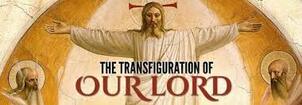Jesus led three apostles up on a high mountain, "And he was transfigured before them; his face shone like the sun and his clothes became white as light." (Mt 17: 1-2). The transfiguration of the Lord points to his glory just before he enters into his passion. In celebrating this feast, we acknowledge and celebrate the revelation of Christ's divine and majestic glory, an experience of the prefiguration of the splendor of heaven. Peter, James, and his brother, John, were given the grace to experience this on the mount of transfiguration as the passion of Christ approached. The feast was inserted into the general liturgical calendar in 1457 by Pope Callistus III to celebrate the defeat, announced in Rome on 6 August, of Turks at Belgrade. Notably, this feast occurs forty days before the Feast of the Exaltation of the Cross, 14 September (see Ordo 2023, p.199).
When I think of transfiguration, my mind wanders to the Eucharistic term, transubstantiation. I yield to this positive deviation by placing it side by side by comparing transfiguration with transubstantiation. The glossary to the Catechism of the Catholic Church defines transfiguration as "The mysterious event in which Jesus, seen speaking with Moses and Elijah on the mountain, was transformed in appearance-in the sight of Peter, James, and John- as a moment of disclosure of his divine glory" and transubstantiation as "The scholastic term used to designate the unique change of the Eucharistic bread and wine into the Body and Blood of Christ. 'Transubstantiation indicates that through the consecration of the bread and wine there occurs the change of the entire substance of the bread into the substance of the Body of Christ, and of the entire substance of the wine into the Blood of Christ-even though the appearances or 'species' of bread and wine remains." In the former, change occurs in the appearance (Jesus himself was substantially present in his incarnation), while in the latter, change occurs in the substance of bread and wine.
The core word here is trans; the Latin prefix means moving or carrying across, over, or beyond. Think of the words- transplant, transmission, or transfer. Through grace, something vital goes across from one state to another. This divine act of moving beyond a humanly perceived reality to another is to strengthen our faith. In both cases, the effected change points to the destiny of Christians- a foretaste of heaven in this valley of tears. We receive, even now, through grace, the privilege of participation in the glory of heaven, the promise of salvation.
At our parish monthly Eucharistic Adoration on Monday and post-mass silent adoration on Thursday, we will experience the presence of the divine splendor of Christ, similar to the incredible experience of Peter, James and John in the presence of the transfigured Christ on the holy mountain. Let us meet Christ face to face to converse with Him, and let us adore His divine presence in the transubstantiated bread, the Blessed Sacrament.
The feast of St. Dominic, the founder of the Order of Preachers, is on the 8th of August. It is a special day for Dominican friars to celebrate our brotherhood. To this effect, I will host my Dominican brothers in our parish. We shall have mass together and eat lunch afterward. Please, pray for us and pray with us.
In His Joy,
Fr. Bernard, OP

 RSS Feed
RSS Feed